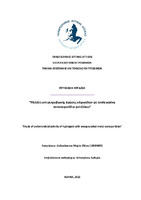| dc.contributor.advisor | Batrinou, Anthimia | |
| dc.contributor.author | Ανδριάκαινα, Μαρία Ελένη | |
| dc.date.accessioned | 2023-11-07T08:50:26Z | |
| dc.date.available | 2023-11-07T08:50:26Z | |
| dc.date.issued | 2023-09-26 | |
| dc.identifier.uri | https://polynoe.lib.uniwa.gr/xmlui/handle/11400/5597 | |
| dc.identifier.uri | http://dx.doi.org/10.26265/polynoe-5434 | |
| dc.description.abstract | Επί του παρόντος, η ανάπτυξη αντιμικροβιακών υδρογελών με εγκλεισμένα νανοσωματίδια μετάλλων για την αντιμετώπιση της αυξανόμενης επικράτησης μικροβιακών λοιμώξεων, αποτελεί επίκεντρο της παγκόσμιας βιοϊατρικής έρευνας αλλά και της
προκειμένης εργαστηριακής μελέτης. Η παρούσα εργασία ασχολήθηκε με τον έλεγχο αντιμικροβιακής δράσης αλγινικών υδρογελών, εμπλουτισμένων ή μη, με νανοσωματίδια αργύρου και εκχύλισμα φύλλου ελιάς, έναντι παθογόνων βακτηρίων και ζυμών. Ο αντιμικροβιακός έλεγχος πραγματοποιήθηκε με τη χρήση των μεθόδων διάχυσης φρεατίου και δίσκου σε άγαρ καθώς και με την αυτοματοποιημένη φασματοφωτομετρική τεχνολογία Bioscreen C. Ακολούθησε μελέτη και στατιστική ανάλυση των αποτελεσμάτων δράσης με χρήση των προγραμμάτων Microsoft Excel 2010 και του μικροβιολογικού λογισμικού DMFit ComBase. Με βάση τις συνολικές παρατηρήσεις της τεχνικής Bioscreen C, εντοπίστηκαν αξιοσημείωτα αποτελέσματα αντιμικροβιακής δράσης και κυρίως βακτηριοστατικής δράσης της υδρογέλης με αλγινικό οξύ-AgNPs-εκχύλισμα φύλλου ελιάς-NADES έναντι των μικροοργανισμών Escerichia coli NCTC 12241/ATCC 25922, Salmonella typhimurium NCTC 12023/ATCC 14028, Listeria monocytogenes NCTC 7973/ATCC 35152, Pseudomonas aeruginosa NCTC 12903/ATCC 27853 και Yersinia enterocolitica NCTC 12982/ATCC 9610, Staphylococcus aureus NCTC 10788/ATCC 6538, Bacillus cereus NCTC 10320/ATCC 9634, Saccharomyces cerevisiae NCPF 3255/ATCC 2091 και Lachancea. Οι υδρογέλες με αλγινικό οξύ CaCl2, με αλγινικό οξύ-εκχύλισμα φύλλου ελιάς-NADES και με αλγινικό οξύ-NADES εμφάνισαν επίσης δράση αναστολής στην ανάπτυξη των παραπάνω μικροβιακών στελεχών, αλλά σε ηπιότερο βαθμό. Αντιθέτως, τα αποτελέσματα της μεθόδου διάχυσης δίσκου σε άγαρ έναντι της Escerichia coli NCTC 12241/ATCC 25922, για τα τέσσερα δείγματα υδρογελών που αναφέρθηκαν, δεν αποτύπωσαν επαρκή αντιμικροβιακή δράση. | el |
| dc.format.extent | 126 | el |
| dc.language.iso | el | el |
| dc.publisher | Πανεπιστήμιο Δυτικής Αττικής | el |
| dc.rights | Αναφορά Δημιουργού - Μη Εμπορική Χρήση - Παρόμοια Διανομή 4.0 Διεθνές | * |
| dc.rights | Attribution-NoDerivatives 4.0 Διεθνές | * |
| dc.rights | Attribution-NoDerivatives 4.0 Διεθνές | * |
| dc.rights | Attribution-NoDerivatives 4.0 Διεθνές | * |
| dc.rights.uri | http://creativecommons.org/licenses/by-nd/4.0/ | * |
| dc.subject | Υδρογέλες | el |
| dc.subject | Αλγινικό | el |
| dc.subject | Νανοσωματίδια μετάλλων | el |
| dc.subject | Αντιμικροβιακή δράση | el |
| dc.subject | Εκχύλισμα φύλλου ελιάς | el |
| dc.subject | Παθογόνοι | el |
| dc.subject | Bioscreen C | el |
| dc.subject | Hydrogels | el |
| dc.subject | Alginate | el |
| dc.subject | Metal nanoparticles | el |
| dc.subject | Antimicrobial activity | el |
| dc.subject | Olive leaf extract | el |
| dc.subject | Pathogens | el |
| dc.title | Μελέτη αντιμικροβιακής δράσης υδρογελών με εγκλεισμένα νανοσωματίδια μετάλλων | el |
| dc.title.alternative | Study of antimicrobial activity of hydrogels with encapsulated metal nanoparticles | el |
| dc.type | Πτυχιακή εργασία | el |
| dc.contributor.committee | Κοντελές, Σπυρίδων | |
| dc.contributor.committee | Zoumpoulakis, Panagiotis | |
| dc.contributor.committee | Κοντελές, Σπυρίδων | |
| dc.contributor.faculty | Σχολή Επιστημών Τροφίμων | el |
| dc.contributor.department | Τμήμα Επιστήμης και Τεχνολογίας Τροφίμων | el |
| dc.description.abstracttranslated | Currently, the development of antimicrobial hydrogels with encapsulated metal nanoparticles, to address the increasing prevalence of microbial infections, is in the center of global biomedical research as well as the present laboratory study. The present work dealt with the control of antimicrobial activity of alginate hydrogels, enriched or not, with silver nanoparticles and olive leaf extract, against pathogenic bacteria and yeasts. Antimicrobial testing was performed using the agar well and disk diffusion methods as well as the automated spectrophotometric technology of Bioscreen C. This was followed by study and statistical analysis of the antimicrobial action results using Microsoft Excel 2010 program and DMFit ComBase microbiological software. Based on the overall observations of the Bioscreen C technique, remarkable antimicrobial activity results and mainly bacteriostatic action of alginate-AgNPs-olive leaf extract-NADES hydrogel were detected against the microorganisms Escerichia coli NCTC 12241/ATCC 25922, Salmonella typhimurium NCTC 12023/ATCC 14028, Listeria monocytogenes NCTC 7973/ATCC 35152, Pseudomonas aeruginosa NCTC 12903/ATCC 27853 and Yersinia enterocolitica NCTC 12982/ATCC 9610, Staphylococcus aureus NCTC 10788/ATCC 6538, Bacillus cereus NCTC 10320/ATCC 9634, Saccharomyces cerevisiae NCPF 3255/ATCC 2091 and Lachancea. The hydrogels with alginate CaCl2, with alginate-olive leaf extract-NADES and with alginate-NADES also showed an inhibitory effect on the growth of the above microbial strains, but to a lesser extent. In contrast, the results of agar disk diffusion method, for the four hydrogel samples that was reported, did not capture any sufficient antimicrobial activity against Escerichia coli NCTC 12241/ATCC 25922. | el |



